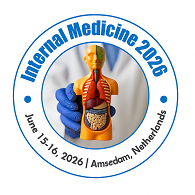Sessions and Tracks
Track 1 : Chronic Disease Management
Chronic Disease Management is a fundamental component of contemporary healthcare, addressing the on-going care and treatment of individuals with long-term health conditions such as diabetes, hypertension, heart disease, chronic respiratory illnesses, and more. This field emphasizes a holistic, patient-centered approach to enhance patient outcomes, quality of life, and healthcare efficiency. Managing a chronic disease goes far beyond just simple blood tests or treating symptoms – it strives to reduce symptoms while also controlling the condition and its progression. Also, one health condition may be causing or significantly impacting another health condition, so understanding this relationship can help you and your doctor manage the disease effectively. Your doctor may also examine your lifestyle to understand what other factors are possibly contributing to your chronic condition. For example, if you have diabetes, an unhealthy diet can make it worse; if you have asthma, living in an environment with airborne irritants can cause more asthma attacks.Managing your disease involves understanding not only your disease, but also your environment and lifestyle – and their impacts on your condition. Managing all of the various factors can help to slow down the progression of chronic diseases.
Track 2 : Preventive Medicine and Health Promotion
Preventive Medicine and Health Promotion are essential components of public health, focusing on the prevention of diseases and the promotion of health and well-being across populations. This field encompasses a wide range of activities, from individual health interventions to community-wide initiatives, aimed at reducing the burden of illness and enhancing quality of life. Efforts to prevent the onset of disease before it occurs through measures such as vaccination, healthy lifestyle choices, and environmental modifications. Early detection and prompt treatment of diseases to halt their progression, such as screenings and regular health check-ups. Management and rehabilitation to reduce complications and improve the quality of life for individuals with chronic illnesses. Providing information and resources to educate the public about healthy behaviors and risk factors for diseases. Utilizing various platforms, including schools, workplaces, and media campaigns, to disseminate health knowledge. Promoting lifestyle changes such as healthy eating, regular physical activity, smoking cessation, and moderation in alcohol consumption. Implementing programs that encourage adherence to these behaviours through support groups, counselling, and incentives. Developing community-based programs to address local health issues and disparities. Engaging community leaders and stakeholders to create supportive environments for healthy living.
Track 3 : Patient-Centered Care and Clinical Decision-Making
Patient-centered care and clinical decision-making are foundational principles in modern healthcare that emphasize the importance of involving patients in their own care. This approach ensures that healthcare decisions are aligned with patients' preferences, values, and individual needs, leading to improved health outcomes and patient satisfaction. Patient-centered care and clinical decision-making includes digital tools that have the potential to support patient-centered care by helping clinicians and patients make the best decisions given each individual’s circumstances and preferences. PC CDS is the focus of the CDSiC, and it supports individual patients and/or caregivers and their care teams in engaged, shared decision-making to make the best health-related choices and actions using information from patient-centered outcomes research (PCOR) findings and/or patient-specific information. Recognizing and respecting each patient's unique preferences, needs, and values. Involving patients in discussions about their care and ensuring their preferences guide clinical decisions Providing care that considers the whole person, including their physical, emotional, social, and spiritual needs. Ensuring clear, compassionate, and open communication between patients and healthcare providers. Patients feel respected, heard, and valued, leading to increased trust and satisfaction with healthcare services.Reduced anxiety and stress through better communication and understanding. Patient-centered care and clinical decision-making are integral to delivering high-quality healthcare that meets the diverse needs of patients.
Track 4 : Innovations in Healthcare Technology and Telemedicine
The healthcare industry is undergoing a significant transformation driven by innovations in technology and the rapid adoption of telemedicine. These advancements are reshaping how healthcare is delivered, improving access, enhancing patient outcomes, and reducing costs. Here, we explore some of the most impactful innovations in healthcare technology and telemedicine. Telemedicine platforms enable patients to consult with healthcare providers remotely via video calls, reducing the need for in-person visits and improving access to care, especially in rural and underserved areas. Wearable devices and remote monitoring tools allow continuous tracking of patients' vital signs, such as heart rate, blood pressure, and glucose levels. This enables timely interventions and chronic disease management. Mobile applications facilitate telehealth services, providing patients with easy access to medical advice, prescription refills, and appointment scheduling. Artificial Intelligence (AI) and Machine Learning like AI algorithms are being used to analyze medical images (such as X-rays, MRIs, and CT scans) for early detection of diseases like cancer, potentially improving diagnostic accuracy and speed. Machine learning models can predict patient outcomes and disease progression, helping healthcare providers develop personalized treatment plans and preventive strategies. Electronic Health Records (EHRs) and Health Information Exchange EHRs centralize patient information, allowing healthcare providers to access and share patient data seamlessly across different care settings, improving coordination and continuity of care.
Track 5 : Primary Care Research and Evidence-Based Practice
Primary care serves as the cornerstone of healthcare systems, providing comprehensive and continuous care to patients. The integration of primary care research and evidence-based practice (EBP) is essential for enhancing the quality, effectiveness, and efficiency of healthcare services. This approach ensures that clinical decisions are informed by the best available evidence, tailored to patient needs, and implemented through rigorous research methodologies. Here, we delve into the importance, methodologies, and impact of primary care research and EBP. Primary care research aims to identify best practices, optimize treatment protocols, and develop preventive strategies that enhance patient outcomes and quality of life. Research in primary care addresses common and chronic conditions such as hypertension, diabetes, mental health disorders, and infectious diseases, contributing to better public health management Research findings inform policy decisions, resource allocation, and healthcare delivery models, promoting a more efficient and effective healthcare system Randomized Controlled Trials (RCTs): RCTs are the gold standard for evaluating the efficacy of interventions. In primary care, RCTs assess treatments, preventive measures, and healthcare delivery models.Observational Studies Cohort, case-control, and cross-sectional studies provide insights into disease prevalence, risk factors, and natural histories in primary care settings.Qualitative Research Interviews, focus groups, and ethnographic studies explore patient experiences, healthcare provider perspectives, and contextual factors influencing healthcare delivery.
Track 6 : Pediatric and Geriatric Care
Paediatric and geriatric care are specialized fields within healthcare that focus on distinct age groups—children and older adults, respectively. Each requires unique approaches tailored to the developmental and physiological characteristics of these populations. Here’s an overview of pediatric and geriatric care, Pediatric care refers to medical care provided to infants, children, and adolescents up to the age of 18 years (sometimes extended to 21 years in some healthcare systems). It encompasses preventive care, diagnosis, treatment, and management of illnesses specific to these age groups. Pediatric care addresses the rapid physical growth and development that occur during childhood and adolescence. This includes monitoring growth parameters, developmental milestones, and nutritional needs. Understanding the cognitive, emotional, and social development of children is crucial for providing age-appropriate care and support. Regular check-ups to monitor growth, development, and immunization schedules. Geriatric care focuses on the health and well-being of older adults, typically aged 65 years and older. It addresses age-related changes, chronic conditions, and maintaining quality of life in later years. Collaborative care involving geriatricians, nurses, social workers, and therapists to address medical, functional, and psychosocial aspects Providing compassionate care focused on comfort, dignity, and quality of life for elderly patients nearing the end of life. Pediatric and geriatric care represent critical components of healthcare delivery that cater to unique age-specific needs and challenges.
Track 7 : Mental Health and Addiction Medicine
Mental health and addiction medicine are crucial fields within healthcare that address a range of conditions affecting individuals' mental well-being and substance use disorders. Mental health refers to emotional, psychological, and social well-being. It encompasses the ability to cope with stress, relate to others, and make decisions effectively. Conditions include depression, anxiety disorders, schizophrenia, bipolar disorder, and post-traumatic stress disorder (PTSD), among others. Counselling and therapy sessions aimed at understanding and modifying behaviors, thoughts, and emotions. Pharmacological treatments to manage symptoms and stabilize mental health conditions. Peer support networks for individuals facing similar mental health challenges. Peer support networks for individuals facing similar mental health challenges. Medically supervised withdrawal management to safely remove substances from the body. Addiction medicine focuses on the prevention, diagnosis, and treatment of substance use disorders (SUDs) and addictive behaviors. Includes alcohol and drug dependence, gambling addiction, and other behavioral addictions. Medically supervised withdrawal management to safely remove substances from the body. Mental health and addiction medicine are integral to addressing the complex needs of individuals affected by mental illness and substance use disorders.
Track 8 : Nutrition, Lifestyle Medicine, and Obesity Management
Nutrition, lifestyle medicine, and obesity management are interconnected fields crucial for promoting health and preventing chronic diseases. Study of nutrients in food, their absorption, metabolism, and their impact on health. Includes macronutrients (carbohydrates, proteins, fats) and micronutrients (vitamins, minerals). Proper nutrition supports overall health and reduces the risk of chronic diseases like heart disease, diabetes, and certain cancers. Recommendations for regular exercise to improve cardiovascular health, muscle strength, and overall well-being. Techniques like mindfulness, meditation, and relaxation exercises to reduce stress-related health risks. Obesity is a global health concern associated with increased risk of chronic diseases such as type 2 diabetes, cardiovascular disease, and certain cancers. Addressing obesity requires a multifaceted approach involving nutrition, physical activity, and behavioral changes. Regulations promoting healthier food environments, physical activity promotion, and obesity prevention programs in schools and communities. Campaigns raising awareness about the importance of healthy lifestyles and obesity risks. Nutrition, lifestyle medicine, and obesity management play pivotal roles in promoting health, preventing chronic diseases, and improving quality of life.
Track 9 : Cardiovascular Health
Cardiovascular health refers to the optimal functioning and well-being of the heart and blood vessels. It encompasses a range of factors that contribute to the prevention of cardiovascular diseases (CVD) and the promotion of overall heart health. Understanding the structure and function of the heart, including its chambers, valves, and electrical system. Monitoring heart rate variability and maintaining optimal blood pressure levels to support heart function. Ensuring healthy arteries, veins, and capillaries for efficient blood flow throughout the body. Addressing lifestyle factors such as smoking, unhealthy diet, physical inactivity, and stress. Genetic predisposition, age, gender, and family history of cardiovascular diseases. Emphasizing a balanced diet rich in fruits, vegetables, whole grains, lean proteins, and healthy fats to support heart health. Engaging in aerobic exercises, strength training, and flexibility exercises to improve cardiovascular fitness and reduce the risk of CVD. Supporting policies that promote heart-healthy environments, including smoke-free laws, access to healthy foods, and safe places for physical activity. Raising awareness about cardiovascular diseases, their risk factors, and preventive measures through community programs and public campaigns.
Track 10: Respiratory Medicine
Respiratory medicine, also known as pulmonology, focuses on the diagnosis, treatment, and management of diseases and conditions affecting the respiratory system. This branch of medicine encompasses a wide range of respiratory disorders, from common conditions like asthma and chronic obstructive pulmonary disease (COPD) to more complex diseases such as interstitial lung diseases and pulmonary hypertension. Assessing lung function through spirometry, lung volumes, and diffusion capacity tests. Using chest X-rays, CT scans, and MRI scans to diagnose lung diseases and assess lung structure. Examining airways and obtaining tissue samples for diagnosis using a flexible tube inserted through the nose or mouth. Common Respiratory Conditions like Asthma Chronic inflammation of the airways leading to recurrent episodes of wheezing, breathlessness, chest tightness, and coughing.Chronic Obstructive Pulmonary Disease (COPD) A progressive lung disease characterized by airflow limitation, often caused by smoking.Pneumonia is Inflammation of lung tissue caused by bacterial, viral, or fungal infections, leading to symptoms like fever, cough, and difficulty breathing.Pulmonary Embolism Blockage of a pulmonary artery by a blood clot, causing sudden onset of chest pain, shortness of breath, and in severe cases, shock.Advanced Respiratory Diseases Interstitial Lung Diseases (ILDs) is a Group of disorders causing inflammation and scarring of lung tissue, impairing oxygen exchange. Pulmonary Hypertensio is High blood pressure in the pulmonary arteries, leading to symptoms such as shortness of breath, fatigue, and chest pain.
Track 11 : Womens Health
Women's health encompasses a wide range of medical, social, and psychological issues that specifically affect women throughout their lives. It includes aspects of reproductive health, as well as conditions and diseases that are more prevalent or unique to women. Managing menstrual disorders such as irregular periods, heavy bleeding (menorrhagia), and painful periods (dysmenorrhea). Providing options for birth control, including hormonal methods (pills, patches, injections), intrauterine devices (IUDs), and barrier methods Addressing issues related to infertility, including evaluation, treatment options such as fertility medications, assisted reproductive technologies (ART), and counseling. Monitoring maternal health during pregnancy, managing complications, and promoting prenatal care to ensure the health of both mother and baby. Performing pelvic exams, Pap smears (cervical cancer screening), and breast exams to detect abnormalities early. Women's health is essential for overall well-being and quality of life. By addressing the unique health needs and concerns of women, healthcare providers can improve health outcomes, prevent disease, and promote healthy aging. Comprehensive care that considers biological, psychological, and social factors helps empower women to make informed decisions about their health and advocate for their own well-being. Addressing disparities in healthcare access and quality, advocating for policies that improve women's health outcomes. Supporting reproductive rights, promoting gender equity in healthcare research and treatment, and addressing social determinants of health.
Track 12 : Endocrinology and Metabolic Disorders
Endocrinology and metabolic disorders encompass a diverse range of conditions related to hormones and metabolism. Understanding how hormones produced by glands such as the thyroid, adrenal glands, pancreas (insulin), and pituitary gland regulate various bodily functions. Diagnosing and treating disorders caused by hormone overproduction (hypersecretion) or underproduction (hyposecretion), such as hypothyroidism, hyperthyroidism, and adrenal insufficiency. Autoimmune condition where the pancreas produces little to no insulin, requiring lifelong insulin replacement therapy. Metabolic disorder characterized by insulin resistance, often managed with lifestyle changes, oral medications, or insulin therapy. Temporary condition during pregnancy that can increase risk for both mother and baby, managed through diet, exercise, and sometimes insulin. Managing excess body weight that contributes to metabolic disorders, cardiovascular disease, and other health complications. Cluster of conditions including high blood pressure, elevated blood sugar levels, excess body fat around the waist, and abnormal cholesterol levels, increasing risk of heart disease, stroke, and type 2 diabetes. Endocrinology plays a crucial role in maintaining overall health and well-being by regulating hormone balance and metabolic processes. Effective management and treatment of endocrine disorders can improve quality of life, prevent complications such as cardiovascular disease and osteoporosis, and reduce the risk of long-term health problems. Research and advancements in this field continue to lead to better diagnostic tools, treatments, and strategies for managing endocrine and metabolic disorders.
Track 13 : Renal Medicine
Renal medicine, also known as nephrology, is the branch of medicine focused on the study and treatment of kidney diseases. Understanding the anatomy and physiology of the kidneys, including their role in filtering blood, regulating electrolyte balance, and producing hormones like erythropoietin. Assessing and managing CKD progression through stages based on estimated glomerular filtration rate (eGFR) and markers of kidney damage. Identifying underlying causes such as diabetes, hypertension, autoimmune diseases, and genetic disorders. Rapid decline in kidney function due to conditions like severe infections, dehydration, medications, or surgical complications. Treating underlying causes, optimizing fluid balance, and monitoring kidney function for recovery. Disorders affecting the glomeruli (filtering units) of the kidneys, including glomerulonephritis and nephrotic syndrome. Diagnosis through urine tests, blood tests, and kidney biopsy, with treatment aimed at reducing inflammation and preserving kidney function. Filter blood using a machine to remove waste products and excess fluids, typically performed in a clinic setting several times per week. Renal medicine plays a vital role in maintaining kidney health, managing chronic conditions, and providing life-saving treatments for patients with kidney failure. Early diagnosis and intervention can help slow the progression of kidney disease and improve outcomes for patients. Research continues to advance understanding of kidney disorders, leading to better prevention strategies, diagnostic tools, and treatment options in nephrology.
Track 14 : Gastroenterology
Gastroenterology is the medical specialty that focuses on the digestive system and its disorders. It encompasses the study, diagnosis, and treatment of conditions affecting the gastrointestinal (GI) tract, liver, Using flexible scopes to visualize and biopsy the upper GI tract (esophagus, stomach, duodenum) and lower GI tract (colon, rectum). Screening and diagnosing conditions of the colon and rectum, including polyps and colorectal cancer. Swallowable camera to examine the small intestine for conditions like Crohn's disease or obscure bleeding. Chronic inflammatory conditions like Crohn's disease and ulcerative colitis affecting the intestines. Functional disorder causing abdominal pain, bloating, and changes in bowel habits without evidence of structural damage. Disorders with no structural abnormalities but causing significant symptoms, including functional dyspepsia (indigestion), chronic constipation, and functional abdominal pain syndrome. Conditions affecting the movement of food and waste through the digestive system, such as gastroesophageal reflux disease (GERD), dysphagia (difficulty swallowing), and gastroparesis (delayed stomach emptying). Nutritional support for patients with GI disorders, including dietary management of celiac disease, lactose intolerance, and malabsorption syndromes. Gastroenterology plays a crucial role in maintaining digestive health, diagnosing and treating a wide range of disorders that affect the GI tract and associated organs. Early detection and management of gastrointestinal conditions can improve patient outcomes and quality of life. Advances in technology and research continue to enhance diagnostic accuracy, treatment options, and patient care in gastroenterology.
Track 15 : Dermatology in Primary Care
Dermatology in primary care plays a crucial role in diagnosing, managing, and preventing skin conditions within the community healthcare setting.Skin Infections Identification and treatment of bacterial, fungal, and viral infections like impetigo, tinea infections, and herpes simplex. Management of antibiotic resistance and appropriate antimicrobial therapy. Diagnosis and management of eczema (atopic dermatitis), psoriasis, and contact dermatitis.Utilization of topical corticosteroids, calcineurin inhibitors, and newer biologic therapies for refractory cases. Treatment strategies for acne vulgaris, including topical and systemic therapies. Use of biologic agents in the treatment of moderate to severe psoriasis and other immune-mediated skin disorders. Management of rosacea with topical agents, oral antibiotics, and laser treatments. Coordination with specialists in dermatology, oncology, rheumatology, and infectious diseases for complex cases. Dermatology in primary care continues to evolve with advancements in diagnostic tools, treatment modalities, and patient-centered care approaches. By staying informed about new therapies and collaborating effectively with specialists, primary care providers can enhance dermatologic outcomes and overall patient wellness.
Track 16 : Oncology and Cancer Care
Oncology and cancer care encompass a wide range of specialized medical practices aimed at prevention, diagnosis, treatment, and supportive care for cancer patients. Promotion of healthy lifestyles, including smoking cessation, balanced nutrition, regular exercise, and sun protection to reduce cancer risk. Implementation of vaccination programs for hepatitis B (liver cancer) and human papillomavirus (HPV-related cancers). Guidelines and strategies for early detection through screening tests such as mammography, colonoscopy, Pap smear, and prostate-specific antigen (PSA) test. Utilization of imaging modalities (CT scan, MRI, PET scan) and biopsy procedures for accurate cancer diagnosis and staging. Genetic and molecular testing to identify specific mutations or biomarkers influencing treatment decisions. Collaboration among oncologists, pathologists, radiologists, surgeons, and other specialists to establish comprehensive treatment plans. Survivorship care plans outlining personalized recommendations for ongoing health maintenance. Empowering patients with knowledge about their disease, treatment options, and supportive resources.Encouraging active participation in shared decision-making and adherence to treatment plans. Oncology and cancer care are dynamic fields that continue to evolve with advancements in technology, personalized medicine, and supportive care strategies. Through interdisciplinary collaboration, ongoing research, and patient-centered approaches, healthcare professionals strive to achieve better outcomes for cancer patients across the continuum of care.
Track 17 : Neurology and Neurological Disorders
Neurology is the branch of medicine focused on the study, diagnosis, treatment, and management of disorders affecting the nervous system. This field encompasses a broad spectrum of conditions and research areas related to neurological disorders. Comprehensive assessment techniques including cranial nerve testing, reflexes, motor and sensory function evaluations, and cognitive assessments. Use of advanced imaging modalities such as MRI, CT scan, and PET scan for detailed anatomical and functional evaluations. Electrophysiological tests like EEG (electroencephalography) and EMG (electromyography) to assess electrical activity in the brain and muscles. Types of stroke (ischemic, hemorrhagic) and management strategies including thrombolytic therapy and neurointerventional procedures. Diagnosis and classification of seizures, antiepileptic medications, ketogenic diet, and surgical options like resective surgery and vagus nerve stimulation (VNS). Gliomas, meningiomas, and metastatic brain tumors.Surgical resection, radiation therapy, chemotherapy, and novel targeted therapies. Neurology and neurological disorders represent a diverse and evolving field at the intersection of medicine, neuroscience, and technology. Ongoing research, multidisciplinary collaboration, and advancements in diagnostic tools and therapeutic strategies continue to enhance our understanding and management of these complex conditions, aiming to improve outcomes and quality of life for patients worldwide.
Track 18 : Palliative and End-of-Life Care
Palliative and end-of-life care focuses on providing compassionate support and symptom management for patients with serious illnesses, particularly those with limited life expectancy. Addressing physical symptoms such as pain, nausea, fatigue, and dyspnea (shortness of breath).Managing psychological distress, including anxiety, depression, and existential concerns.Providing spiritual and existential support, respecting diverse beliefs and values. Supporting patients to remain at home with adequate symptom management and caregiver support.Providing education and training for family caregivers. Continuing education for healthcare providers on palliative care principles and practices.Skills development in effective communication, symptom management, and end-of-life care. Advancing knowledge in symptom management, quality of life outcomes, and patient-centered care approaches.Studying innovative interventions to improve care delivery and patient outcomes. Palliative and end-of-life care plays a crucial role in enhancing quality of life and providing dignified support for patients with serious illnesses and their families. By integrating comprehensive symptom management, psychosocial support, and patient-centered decision-making, healthcare providers strive to honor patients' preferences and values throughout their journey towards the end of life.
Track 19 : Integrative and Holistic Medicine
Integrative and holistic medicine represents a comprehensive approach to healthcare that combines conventional medical treatments with complementary and alternative therapies Emphasizes the importance of the patient-provider relationship and shared decision-making.Considers the whole person, including physical, emotional, mental, social, and spiritual dimensions. Integrates evidence-based conventional medicine with complementary therapies such as acupuncture, herbal medicine, chiropractic care, and mind-body practices.Focuses on treatments that are safe, effective, and aligned with patient preferences. Emphasizes preventive measures, lifestyle modifications, and wellness practices to optimize health outcomes.Encourages patients to take an active role in their health through education and empowerment. Tailors treatment plans to individual patient needs, considering their unique health goals, beliefs, and preferences.Considers genetic, environmental, and lifestyle factors influencing health and disease. Emphasizes whole foods, nutritional supplements, and personalized dietary plans to support health and manage chronic conditions. Utilizes practices such as meditation, yoga, mindfulness-based stress reduction (MBSR), and guided imagery to promote relaxation and reduce stress. Includes physical therapies like massage therapy, chiropractic care, and osteopathic manipulation to address musculoskeletal issues and promote overall well-being. Integrative and holistic medicine integrates the best of conventional and complementary therapies to promote health, prevent illness, and support healing.
Track 20 : Emergency and Critical Care
Emergency and critical care medicine is a specialized field that focuses on the prompt diagnosis and treatment of acute medical conditions that are life-threatening or potentially disabling. It encompasses a wide range of medical emergencies, from trauma and cardiac arrest to severe infections and neurological crises. Immediate assessment and stabilization of traumatic injuries.Rapid decision-making for surgical interventions if necessary. Diagnosis and management of acute coronary syndromes.Advanced cardiac life support (ACLS) protocols for cardiac arrest. Management of acute respiratory failure and airway emergencies.Utilization of mechanical ventilation when indicated. Treatment of stroke, seizures, and traumatic brain injuries.Recognition and management of altered mental status. Identification and rapid treatment of sepsis and other systemic infections.Use of antimicrobial therapy guided by local resistance patterns. Performing invasive procedures like intubation, central venous access, and chest tube insertion.Monitoring and management of hemodynamic instability. Collaboration with multidisciplinary teams including emergency physicians, nurses, intensivists, and surgeons.Communication skills for effective handovers and family discussions. Emergency and critical care medicine plays a pivotal role in saving lives and preventing long-term disabilities through timely intervention and comprehensive patient management.
Track 21 : Genomics and Personalized Medicine
Genomics and personalized medicine are at the forefront of modern healthcare, revolutionizing how diseases are understood, diagnosed, and treated based on individual genetic makeup. Advancements in next-generation sequencing (NGS) technologies allow for rapid and cost-effective analysis of an individual's entire genome or targeted regions.Single-cell sequencing techniques enable studying genetic variations at the cellular level. Tailoring medical treatment to the genetic profile, lifestyle, and environment of each patient.Application of genomics in predicting disease risk, prognosis, and response to therapies. Molecular profiling of tumors to identify driver mutations and potential therapeutic targets.Liquid biopsy techniques for non-invasive monitoring of cancer progression and treatment response. Personalizing drug therapy based on genetic variants that affect drug metabolism, efficacy, and toxicity.Integration of pharmacogenomic data into clinical decision-making to optimize drug selection and dosing. Genetic testing for inherited conditions such as cystic fibrosis, Huntington's disease, and hereditary cancer syndromes.Counseling and management strategies for individuals and families at risk. Increasing awareness and understanding of genomics among healthcare providers, researchers, and the general public.









